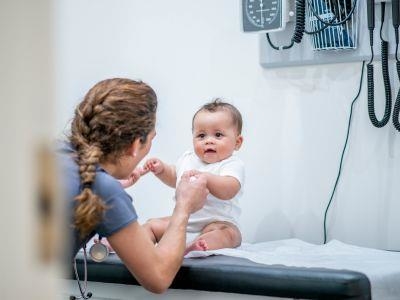Giving Babies a Brighter Future
- 12 August 2024
- 5 min read
One in 10,000 babies born are diagnosed with Spinal Muscular Atrophy (SMA) which can have a debilitating impact on their quality of life and for their families. A new multi-site study hopes to explore the impact that testing for the condition at birth can have on children and their outcomes for the future. We spoke to Tom Simpson to find out more about the study and the potential for it to change newborn screening in the UK.

Bringing Research Opportunities to Wessex
An important part of my role is to identify studies that could be delivered in Wessex to maximise research opportunities for patients. These studies may directly benefit participants but also add to our understanding of diseases and allow new treatments to be developed and tested. In early 2023, the Newborn Screening for SMA Trial running in the Thames Valley and South Midlands region, but nowhere else in the country, was identified as a potential opportunity. It looked like a great study that might benefit the Wessex population, so I contacted the study team to discuss the possibility of opening sites in Wessex.
The SMA trial uses the Guthrie Test, where the baby’s heel prick blood sample taken during the usual newborn screening undergoes an additional test in the laboratory to screen for the condition. It’s a great study for patients and staff because it doesn’t require additional blood samples or interventions and the impact it can have is huge. While SMA is quite rare, around 1 in10,000 babies will be diagnosed with this potentially devastating disease. This test allows the disease to be picked up before symptoms develop, which we know helps to improve outcomes for children with the disease. If babies are screened for SMA at birth and treated early it can be transformative for their quality of life.

There’s obviously an immediate benefit for people who take part now, but the study’s wider aim is to evaluate the uptake and feasibility of screening in the UK. The finding scould inform the case for a national screening programme for SMA which could potentially fit into the current testing system and be done as part of the newborn screening programme.
Setting Up A Collaborative Multi-Site Study
Following a few meetings with the University of Oxford based study team, they were keen to expand the study into Wessex. Locally, newborn screening samples are processed regionally by the laboratory team at Queen Alexandra Hospital in Portsmouth, so the study team reached out to discuss logistics and feasibility of processing samples for the study. With agreement in place from a very supportive Portsmouth lab team, we offered the study opportunity out to sites across the Wessex region. Unsurprisingly, we received many expressions of interest from sites keen to be involved.
From here, the study team began conversations with interested sites to discuss feasibility and inform their site selection. After these discussions and a review of birth rate data, we selected four sites in Wessex – Princess Anne Hospital (University Hospital Southampton NHS Foundation Trust), Queen Alexandra Hospital (Portsmouth Hospitals University NHS Trust), Poole Hospital (University Hospital Dorset NHS Foundation Trust), and Salisbury District Hospital (Salisbury NHS Foundation Trust). Because all the sites were setting up around the same time, we were able to regionally coordinate aspects of setup and communication to streamline the process.
We brought the teams together via regional calls which allowed us to share information, updates and progress in a way that reduced duplication. Adopting this collaborative approach also helped us to share best practice. Our regional calls included the Oxford study team, local research midwives, and R&D teams. This collaboration helped to streamline the process and made set up more efficient, allowing us all to start recruiting sooner and screen even more babies. The intention is to recruit as many babies as possible for this study – for every baby born at our sites to be offered this test.
Our sites have enrolled 4,900 babies so far – which makes it the highest recruiting non-commercial study in Wessex this financial year. Our regular regional calls have continued while the study has been recruiting as a forum to discuss what’s going well, raise any problems that need solving, and to share best practice. Everyone benefits from that. The teams can pre-empt problems and learn from each other’s experiences. Every site has local nuances in how they deliver, but the benefit of regional collaboration has been evident. Now the study is established in Wessex, our sites and the ThamesValley and South Midlands sites, now meet together to further share the benefits of collaborative working.
Changing the Future of National Screening
The study is due to end in March 2025, with new regions in discussion to open in 2024. So far, 23,000 babies havebeen recruited across Thames Valley, Oxford and Wessex. The hope is to recruit as many babies and gather as much data as possible to demonstrate the feasibility of newborn screening for SMA in the UK. With all the conditions that could be screened for at birth, the Government and the UK National Screening Committee have lots of difficult decisions to make on which conditions should or shouldn’t be included in the newborn screening programme. Hopefully this study will provide the evidence to build a case for it to be included.
Some countries have already adopted this test as part of their newborn screening programmes. Economic modelling has also been undertaken to demonstrate the financial viability of newborn screening for SMA versus delayed diagnosis and the long-term treatment and care needs. It’s been fantastic to get Wessex involved in this study, not just for the benefit of our local population but also potentially generating the evidence needed to inform its addition to our national newborn screening programme. This screening has already had a transformative impact on the lives of children with this condition, and their families, by being able to treat them before symptoms set in. Early intervention can enable babies with SMA to lead relatively normal lives.



